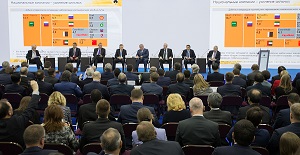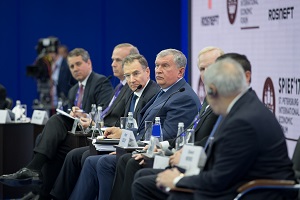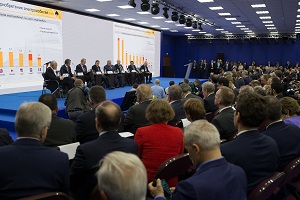Please activate JavaScript in your browser to use all interface options.
Igor Sechin makes a keynote speech at the Summit of Energy Companies
02 June 2017 Rosneft Chief Executive Officer Igor Sechin delivered a keynote speech at the Summit of Energy Companies held during the XXI St. Petersburg International Economic Forum.
Rosneft Chief Executive Officer Igor Sechin delivered a keynote speech at the Summit of Energy Companies held during the XXI St. Petersburg International Economic Forum.
BP CEO Robert Dudley, ExxonMobil Chairman and CEO Darren Woods, Total CEO Patrick Pouyanne, Russian Energy Minister Alexander Novak, Venezuelan Oil Minister Nelson Martinez, GE Oil&Gas CEO and President Lorenzo Simonelli, Statoil CEO Eldar Saetre, Deputy Chairman of Chevron Board of Directors Michael Wirth, Glencore CEO Ivan Glasenberg, Mitsui President and CEO Tatsuo Yasunaga, IHS Markit Vice Chairman Daniel Yergin, Tula Region Governor Alexey Dyumin, Tyumen Region Governor Vladimir Yakushev, Governor of Khanty-Mansi Autonomous Area-Yugra Natalia Komarova, Murmansk Region Governor Marina Kovtun, Head of the Republic of Sakha (Yakutia) Yegor Borisov, Tver Region Governor Igor Rudenya took part in the event. Nobuo Tanaka, Executive Director of the International Energy Agency in 2007-2011 was the moderator of the event.
 In his report, the Head of Rosneft said that the period of low oil prices would last for a long time; Brent prices have fixed in the range of 45 to 50 dollars per barrel of Brent, and the market volatility and uncertainty had significantly increased. "The current "respite" should not calm us down – Igor Sechin said – conditions for the stable operation of the market have not yet been created. A number of large producers that do not participate in the agreements are actively using business environment to strengthen their own market position, which creates prerequisites for a new instability, rather than for entering the path of sustainable growth." The Head of Rosneft stressed that today the key players are preparing to increase production and strengthen the struggle for markets. "We must admit - he said - that if the industry strives for stable and long-term stability, all major producers must participate in the regulation of production."
In his report, the Head of Rosneft said that the period of low oil prices would last for a long time; Brent prices have fixed in the range of 45 to 50 dollars per barrel of Brent, and the market volatility and uncertainty had significantly increased. "The current "respite" should not calm us down – Igor Sechin said – conditions for the stable operation of the market have not yet been created. A number of large producers that do not participate in the agreements are actively using business environment to strengthen their own market position, which creates prerequisites for a new instability, rather than for entering the path of sustainable growth." The Head of Rosneft stressed that today the key players are preparing to increase production and strengthen the struggle for markets. "We must admit - he said - that if the industry strives for stable and long-term stability, all major producers must participate in the regulation of production."
"Under current conditions – the report says – "analysts are already considering scenarios with price parameters of $50-$40 and even $30 per barrel. According to Sechin, a long enough market balance at $ 40 per barrel will bring half the production to the loss rate, primarily at the deepwater projects in Brazil and in Canadian oil sands, and will create problems for shale producers, with an exception of high-efficiency areas of the Permian basin." "Although Russia, Saudi Arabia, a number of efficient US projects, Iran and projects in some other countries will remain competitive, it will not help the consumption market," the Head of Rosneft added.
"To what extent are the renewable energy sources capable to assume the mission of the main resource to cover the growing demand?" he asked the panel participants. "It seems that their possibilities are rather limited. A good and important example for the oil industry is the role and development dynamics of the electric vehicle market." "Issues concerning effective energy storage, ecological properties of storage batteries manufacturing and disposal are of current interest," noted Rosneft CEO. "In many regions, in particular in the European Union, taxes and excises on oil products constitute an important part of the budget revenues sent for social purposes among others. But renewables producers and electric cars consumers got used to the opposite – government subsidies. It is also not clear how an extra demand for electric power generated by mass development of electric car industry will be met." According to Sechin, the same issues apply to other sources of alternative energy, namely irregular government subsidies and the lack of a proper effect on the total energy-consumption balance. In his report he emphasised that the use of traditional energy to subsidise alternative energy is totally unjustified.
 Igor Sechin said that at that time, serious competition to oil majors was made by the producing countries and their national companies which had acquired the necessary experience and competence in the implementation of complex projects. "Their contribution to global production is more than three times the share of the majors," the report says. "The national companies are being strengthened including Saudi Aramco, Qatar Petroleum, CNPC and Sinopec," Sechin said. - And their activity is spreading not only in their countries, but also on a global scale."
Igor Sechin said that at that time, serious competition to oil majors was made by the producing countries and their national companies which had acquired the necessary experience and competence in the implementation of complex projects. "Their contribution to global production is more than three times the share of the majors," the report says. "The national companies are being strengthened including Saudi Aramco, Qatar Petroleum, CNPC and Sinopec," Sechin said. - And their activity is spreading not only in their countries, but also on a global scale."
He described the upcoming IPO of Saudi Aramco as "one of the most significant events in the global energy industry" and highly appreciated the government policy of Saudi Arabia aimed at supporting the national oil company. "Particularly impressive is the principal revision of the tax system to enhance the investment attractiveness of Saudi Aramco," the Head of Rosneft emphasized. "The changes will largely mitigate the tax burden and ensure the growth of dividends. It is clear for IPO organizers and consultants that even with the richest resource base, the remaining inefficient fiscal system would not allow them to approach the declared goals in terms of the company's capitalization level."
Sustainability of the Russian oil production, according to Sechin, was underestimated by the market, but now the causes for this phenomenon are well explained: the quality of the Russian resource base, the successful development of own engineering and service competencies, active work to reduce costs, efficient acquisitions, and high corporate responsibility. "The oil industry of Russia has its own specifics," said the Head of Rosneft, "because it is able to finance its own development, primarily due to internal financial reserves and generated cash flows." Sechin is confident that as the market demand for new supplies grows, Russia will be able to make a significant contribution to meet the demand: the heads of "a number of Russian companies including Rosneft have made the appropriate investment decisions several years ago."
According to Sechin, a major role in the development of the oil market will be played by "partnerships created by Rosneft, which open new opportunities for both European and Asian companies. “These include new projects, opportunities of swap oil supplies and supplies of equipment, participation in joint production and logistics projects for monetization of the Company's resource base", he said.
Sechin called the integral deal on Bashneft stake privatization and the entry of new strategic investors into the capital of Rosneft an important event for the entire Russian economy which made it possible to increase its investment attractiveness.
Finally, the Head of Rosneft said that "today there are tax initiatives related to the introduction of the windfall profits tax which should give new impetus to attracting investments in the industry and would become an important step in creating a competitive fiscal system taking into account the recent experience of Saudi Arabia and the United States". "We can only welcome such initiatives," he concluded.
Presentation GLOBAL OIL MARKET – ON THE PATH TO SUSTAINABLE DEVELOPMENT

-315xx70.png)

